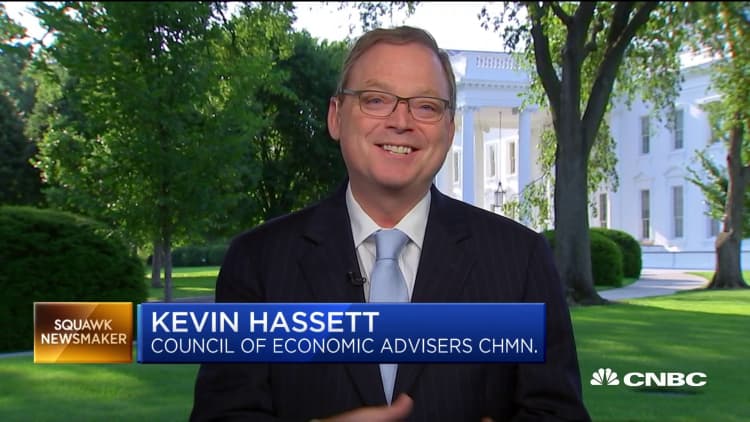
Kevin Hassett told CNBC on Monday his impending departure as White House economic advisor is not related to President Donald Trump's tariff threats on China and Mexico.
Hassett has been chairman of the White House Council of Economic Advisers for about two years.
"This is something that's been in the works for a little while," Hassett said in "Squawk Box" interview. "If you look at the history of the CEA, it's very normal for the chair to move on after two years."
He said he is leaving at the end of this month.
Trump tweeted on Sunday that Hassett will "shortly" leave his post, saying he's "done such a great job for me and the administration" and "his very talented replacement will be named as soon as I get back to the U.S."
Trump began a five-day trip to Britain, France and Ireland on Monday.
Hassett, who said he's unsure of his next position, said the departure is partly out of "respect for the institution" and to spend time with his family.
"The longer you stay in the White House, the closer you get with everybody in the West Wing," he said. "It's normal, circle of life kind of stuff."
Hassett, nominated to the White House role in 2017, worked with Trump senior advisor and son-in-law Jared Kushner on a proposed immigration plan and backed a move to end waivers of sanctions for countries that buy Iranian oil.
The departure comes at rocky times for the U.S. in its relations with Mexico and China. The trade war between Washington and Beijing is escalating, with talks between government officials stalled.
Last week, Trump announced a 5% tariff on all Mexican goods, starting June 10, if that country does not substantially halt illegal immigration across the border. Mexican officials are in Washington on Monday to begin talks over tariffs and border security.
"I think that the president is dealing with an immigration crisis," Hassett said. "They have a list of things that the Mexicans can do ... and I'm heartened to see they're in town to talk about it."
He declined to comment on whether he believes the U.S. and Mexico will come to a deal by next week's tariff deadline.
"If you look at currency movements and tariffs, you can model what the market thinks," he said. "The market definitely doesn't think that it's guaranteed they're going on right now."
Hassett said the administration is looking at the big picture in the economy and is hoping for "positive talks" with Mexico.
"In the near term, impacts are much larger on Mexico than the U.S.," he said, adding he doesn't see a recession in the U.S. economy's future.
Here's a copy of Hassett's resignation letter:
— Reuters contributed to this report


